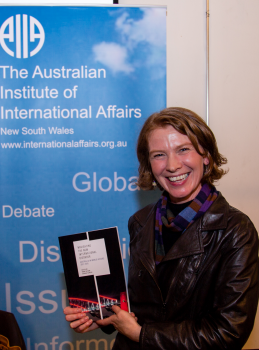Navigating the New International Disorder
At Glover Cottages on Tuesday 11 April, we hosted the NSW launch of Navigating the New International Disorder – Australia in World Affairs 2011-2015 (OUP/AIIA 2017). This is the twelfth edition of the Institute’s Australia in World Affairs, a series which began in 1950.
AIIA NSW vice president Ian Lincoln briefly reviewed the book’s contents: 15 diverse chapters tracing the changing world order since the end of the Cold War including globalisation and China’s rise, and Australia’s role in such bodies as the UN Security Council and the G20.
Our special guest, associate professor Elizabeth Thurbon from UNSW, then took us through her chapter on the contentious and growing division between the Liberal National Coalition and the ALP over trade and industry policy.
Essentially, Elizabeth said, the Liberal-Nationals practise ‘structural agnosticism’, in which all economic activity is created equal and no sector deserves special protection. Hence Joe Hockey’s indifference, as Abbott’s treasurer, to GMH, Ford and Toyota closing their motor vehicle factories across Australia. Preferential bilateral trade arrangements are seen by the Coalition as having a strategic value, whether or not they also attract economic or trade benefits. Hence Howard and Abbott’s strong support for the now apparently still-born TPP, despite the fact that contrary to the free trade claims of its supporters, it would have entrenched the monopolistic rights of existing global corporations and penalised governments which stood in their way.

Elizabeth observed that under Howard and Abbott governments therefore, a raft of PTAs was negotiated or contemplated, including with the United States, Singapore, Thailand, Malaysia, China, Chile, the UAE, ROK, India, Indonesia, Mexico and the Pacific Islands, even though their economic benefits to Australia were vague and imprecisely spelled out.
The ALP on the other hand, accuses the Liberal-Nationals of overselling the benefits of PTAs, and believes that some economic sectors in Australia are more important than others and should be protected: not unconditionally, but time-limited and performance-based. Labor tends therefore to go slow in negotiating PTAs and to support multilateral trade forums, such as the Doha Round, which have a greater chance of securing for Australia concessions in sensitive trade areas such as agriculture and services. It believes free trade policies need to be accompanied by industry support designed to maintain our long-term viability in international trade.
Elizabeth pointed out that with four prime ministers changing roles like musical chairs over five years, the period under review was accompanied by confusing changes in Australia’s trade policies. But she concluded both her address and her chapter by observing that prime minister Turnbull promised to end Abbott’s non-consultative approach to policy-making, and early in his tenure called to Canberra a group of senior business, union and social services representatives in an effort to re-group and re-enliven serious policy debate. But with on-going divisions within the Coalition over climate change and renewable energy, Elizabeth believes it is impossible to predict the future direction the government will take during Turnbull’s remaining tenure.
Richard Broinowski